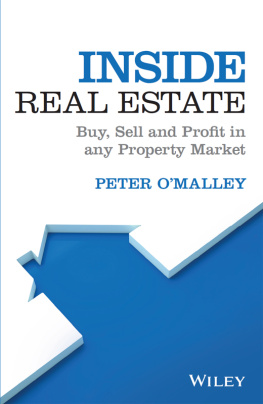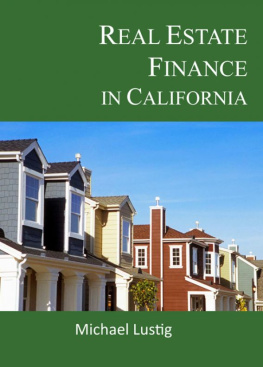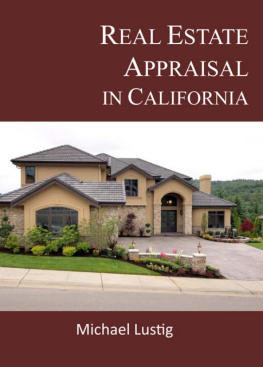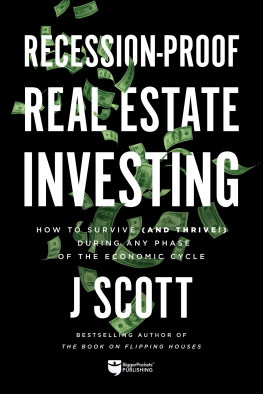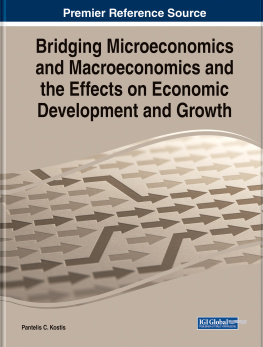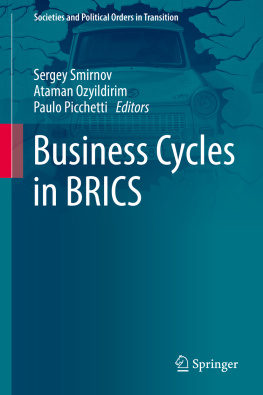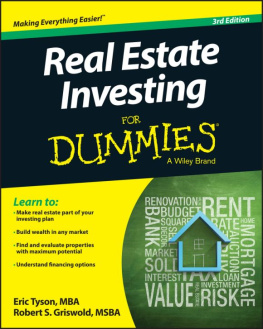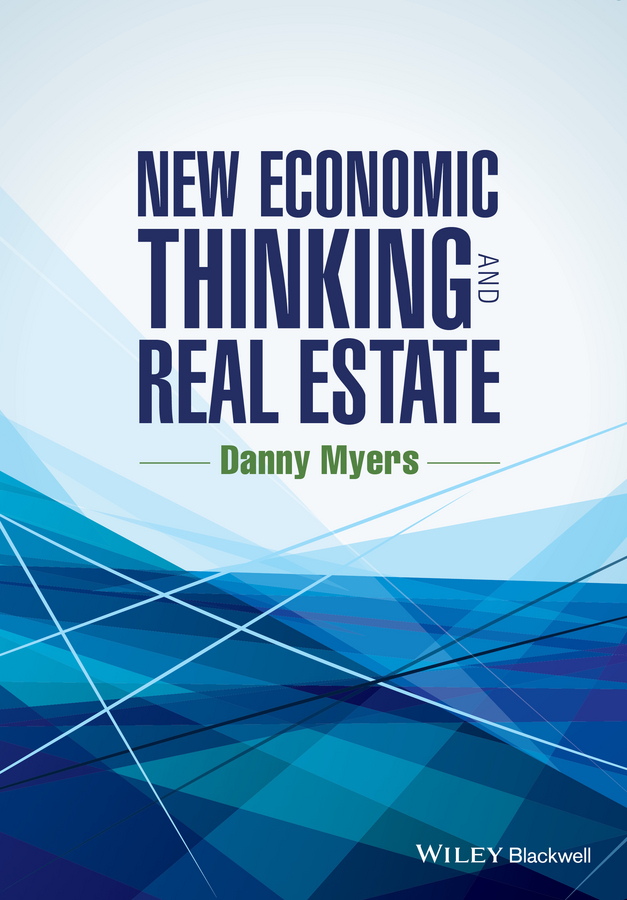
Table of Contents
List of Tables
- Introduction
- Chapter 02
- Chapter 03
- Chapter 05
- Chapter 07
- Chapter 08
List of Illustrations
- Introduction
- Chapter 02
- Chapter 03
- Chapter 04
- Chapter 05
- Chapter 06
- Chapter 07
- Chapter 08
Guide
Pages
New Economic Thinking and Real Estate
Danny Myers
This edition first published 2016
2016 by John Wiley & Sons, Ltd.
Registered Office
John Wiley & Sons, Ltd, The Atrium, Southern Gate, Chichester, West Sussex, PO19 8SQ, United Kingdom.
Editorial Offices
9600 Garsington Road, Oxford, OX4 2DQ, United Kingdom.
The Atrium, Southern Gate, Chichester, West Sussex, PO19 8SQ, United Kingdom.
For details of our global editorial offices, for customer services and for information about how to apply for permission to reuse the copyright material in this book please see our website at www.wiley.com/wiley-blackwell.
The right of the author to be identified as the author of this work has been asserted in accordance with the UK Copyright, Designs and Patents Act 1988.
All rights reserved. No part of this publication may be reproduced, stored in a retrieval system, or transmitted, in any form or by any means, electronic, mechanical, photocopying, recording or otherwise, except as permitted by the UK Copyright, Designs and Patents Act 1988, without the prior permission of the publisher.
Designations used by companies to distinguish their products are often claimed as trademarks. All brand names and product names used in this book are trade names, service marks, trademarks or registered trademarks of their respective owners. The publisher is not associated with any product or vendor mentioned in this book.
Limit of Liability/Disclaimer of Warranty: While the publisher and author(s) have used their best efforts in preparing this book, they make no representations or warranties with respect to the accuracy or completeness of the contents of this book and specifically disclaim any implied warranties of merchantability or fitness for a particular purpose. It is sold on the understanding that the publisher is not engaged in rendering professional services and neither the publisher nor the author shall be liable for damages arising herefrom. If professional advice or other expert assistance is required, the services of a competent professional should be sought.
Library of Congress Cataloging-in-Publication Data
Names: Myers, Danny, author.
Title: New economic thinking and real estate / Danny Myers.
Description: Hoboken : Wiley-Blackwell, 2016. | Includes bibliographical references and index.
Identifiers: LCCN 2016004467 (print) | LCCN 2016023019 (ebook) | ISBN 9781119048756 (paperback) | ISBN 9781119048732 (pdf) | ISBN 9781119048749 (epub)
Subjects: LCSH: Real estate developmentEconomic aspects. | Construction industry. | BISAC: BUSINESS & ECONOMICS / Real Estate.
Classification: LCC HD1390 .M945 2016 (print) | LCC HD1390 (ebook) | DDC 333.33dc23
LC record available at https://lccn.loc.gov/2016004467
A catalogue record for this book is available from the British Library.
Wiley also publishes its books in a variety of electronic formats. Some content that appears in print may not be available in electronic books.
Cover image: Getty Images Hong Li
Foreword
A new form of economic thinking began to emerge in 2008, prompted by the unforeseen financial crisis that had stumbled banks across America and Europe. This catastrophic event also served to accelerate the ongoing academic debate about the relevance of some aspects of the mainstream economics curriculum, which had been simmering across Europe since the turn of the century. As Professor of Economics Diane Coyle (2012) perceptively observed: it was patently obvious that a chasm existed between the interesting questions of real-world problems and the workhorse economics being taught to students. In other words, the financial crisis had highlighted a tension that existed between those who taught traditional, orthodox, neo-classical economics, and those making the case for a modern, heterodox, new economics.
No longer were the scientific methods offered by econometric (mathematical) approaches, or the precision of marginal returns, or economic models based on historical data, held up as sacrosanct. The modern challenge for economists was to make sure that their work is set in a real-world context; that the data and logic used confirms the current circumstances; and lastly, but by no means least important, that the growing scale and complexity of financial markets and products is acknowledged as a key part of economic analysis. As students of this text will discover, rather surprisingly, much of this appears to be in sharp contrast to the established approaches taught by many mainstream economists.
New economic thinking benefits from this debate as it seeks to establish the virtues of a modern approach to economic analysis. In a good number of chapters, this simply involves reiterating basic economic principles; improving the practical grasp of managing and using data; and recognising the importance of the financial sector to the broader economy. In short, what is identified is a selective approach, and content that blends with the times and resonates with the current graduate community as they search for jobs in difficult times.
Another unique feature of this text is its emphasis on the importance of real estate. Far too often, property is overlooked by mainstream texts but, given that many of the risks that banks accept when they provide loans are secured by property (be it residential or commercial), it can no longer be left out of the subject. In fact, real estate assets are too often the window dressing and the noise that confuses the analysis of so many locked into the mind-set of neo-classicism.
New economic thinking, therefore, brings into sharp focus the importance of property, finance and data handling as central tenets to comprehending todays economy. Furthermore, to enhance the approach several links to the internet are included as hyperlinks in the eBook and webnotes in the paperback. The picture we end up presenting is not particularly neat and tidy with answers to closed questions based on tried and tested theory. Instead, we present a view that is slightly more complex in order to develop insight into the practical tools available to economists and enable answers to the open-ended questions that will inevitably arise during your professional career. This is not stated to provide some kind of excuse not to study economics, but to highlight why those who seek to understand the world of real estate need to embrace the language and methodology of 21st century economics.
Introduction: Setting the Scene
This book is designed to provide an introduction to the role of the economy in understanding real estate. To make it topical, the Great Recession that ran across much of Europe from 2008 to 2014 is used to provide the story line, and a defining set of data is outlined in , below. This recessionary saga presents a fascinating set of events that not only allows a broad review of modern economics, but also captures the state of play within the real estate profession. Ironically, the financial crisis that triggered the period of Great Recession took everyone by surprise, and there was no consensus about the solutions. Consequently, the debate over the options ranged far and wide; For example, should a government respond by reducing the national deficit or increasing it? Would lower rates of interest stimulate economic recovery or suppress it? Should welfare benefits be maintained or cut? Does economic inequality damage or encourage economic growth? Should depositors in failed banks be protected or face big losses?
Next page

